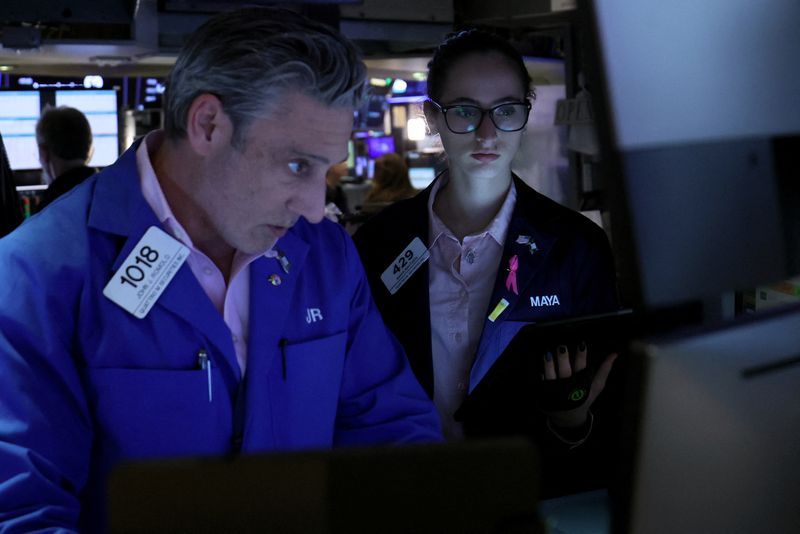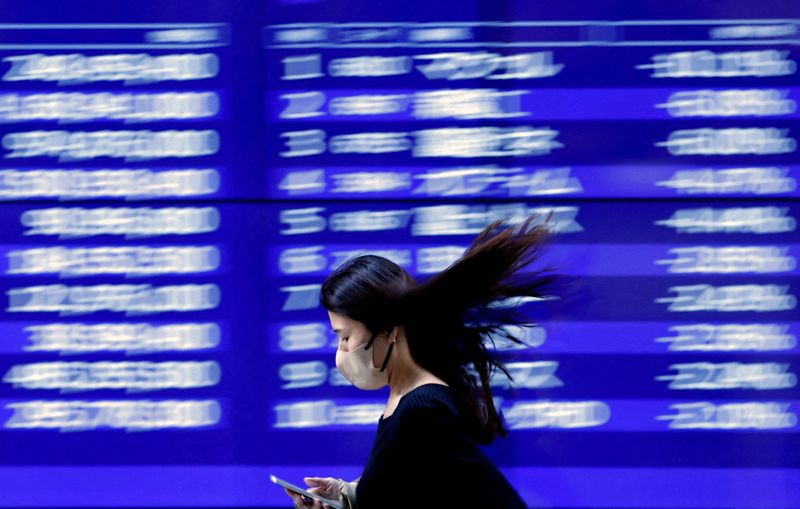By Chris Prentice and Amanda Cooper
NEW YORK/LONDON (Reuters) -Global shares rose on Tuesday, with investors on Wall Street focused on earnings reports from the U.S. megacaps, and the yen tumbled to multi-year lows against the dollar and the euro.
Treasury yields dipped after data showed U.S. business activity cooled to a four-month low.
Easing concerns about the threat of a major re-escalation of tension in the Middle East and a focus on company earnings brought renewed risk appetite from investors.
MSCI's gauge of stocks across the globe rose 9.14 points, or 1.22%, to 758.4, further pulling away from Friday's two-month low.
The Dow Jones Industrial Average rose 263.71 points, or 0.69%, to 38,503.69, the S&P 500 gained 59.95 points, or 1.20%, to 5,070.55 and the Nasdaq Composite rose 245.34 points, or 1.59%, to 15,696.64.
Tesla (NASDAQ:TSLA) posted a decline in first quarter revenue after the market close but shares surged nearly 9% in after-hours trading after it said it would introduce new models before the second half of next year.
The FTSE 100 hit a record high and finished up 1.10%. The STOXX 600 rose 1.09% on gains in the technology sector.
Adding to the optimism was a series of surveys of business activity that showed Germany returned to growth in early April after months of contraction, while activity in the broader euro zone expanded at its fastest clip in nearly a year.
"We are turning a bit more positive on risk sentiment. There still remains a fair bit of uncertainty around geopolitics and rising U.S. real yields, but we are more positive than we were a week ago," said Mohit Kumar, a strategist at Jefferies.
The dollar retreated from its recent highs, but was comfortably supported by the view among investors that no U.S. rate cuts will be forthcoming anytime soon from the Federal Reserve and by the climb this month in Treasury yields to their highest since November.
On Wall Street, big tech shares outperformed ahead of quarterly results this week.
"Odds are the earnings reports that we see over the next few weeks will be positive, but obviously there's still issues around what the Fed will do next," said Shane Oliver, chief economist at AMP, noting that security concerns also remained. "It's too early to say that problems in the Middle East have gone away."
"There are lots of things that could cause volatility between now and the end of the year. And so we're probably coming to a more constrained, more volatile period for markets."
MEGA WOBBLE?
UBS on Monday downgraded its rating on the mega-cap companies, warning that profit growth momentum of the so-called Big Six technology stocks could "collapse" over the next few quarters.
U.S. business activity, quarterly economic growth and a measure of monthly inflation top the macro data bill this week.
Traders now expect the first Fed rate cut to come most likely in September and see just 40 basis points of cuts this year, compared with expectations for 150 bps of cuts at the beginning of the year.
The yield on benchmark U.S. 10-year notes fell 1.9 basis points to 4.605%, from 4.623% late on Monday.
The 30-year bond yield rose 0.5 basis points to 4.7293% from 4.724%.
The 2-year note yield, which typically moves in step with interest rate expectations, fell 3.4 basis points to 4.9374%, from 4.971%.
The European Central Bank is expected to cut rates in June. The euro was last up 0.45% at $1.0703. It struck a five-month low of $1.0601 last week.
The yen recovered after sinking to another 34-year low against the dollar.
Japan's finance minister Shunichi Suzuki said last week's trilateral meeting with his U.S. and South Korean counterparts laid the groundwork for Tokyo to take appropriate action in the foreign exchange market.
This is the clearest warning yet from Japanese monetary authorities that tolerance for the slide in the currency is wearing thin and official intervention to prop it up is likely.

In commodities, spot gold extended the previous session's losses, down 0.2% at $2,321.57 an ounce. U.S. gold futures settled 0.2% lower at $2,342.10.
Oil prices were up as investors continued to assess the situation in the Middle East. Brent crude futures rose 1.63% to $88.42 a barrel and U.S. crude settled up 1.78% at $83.36.
